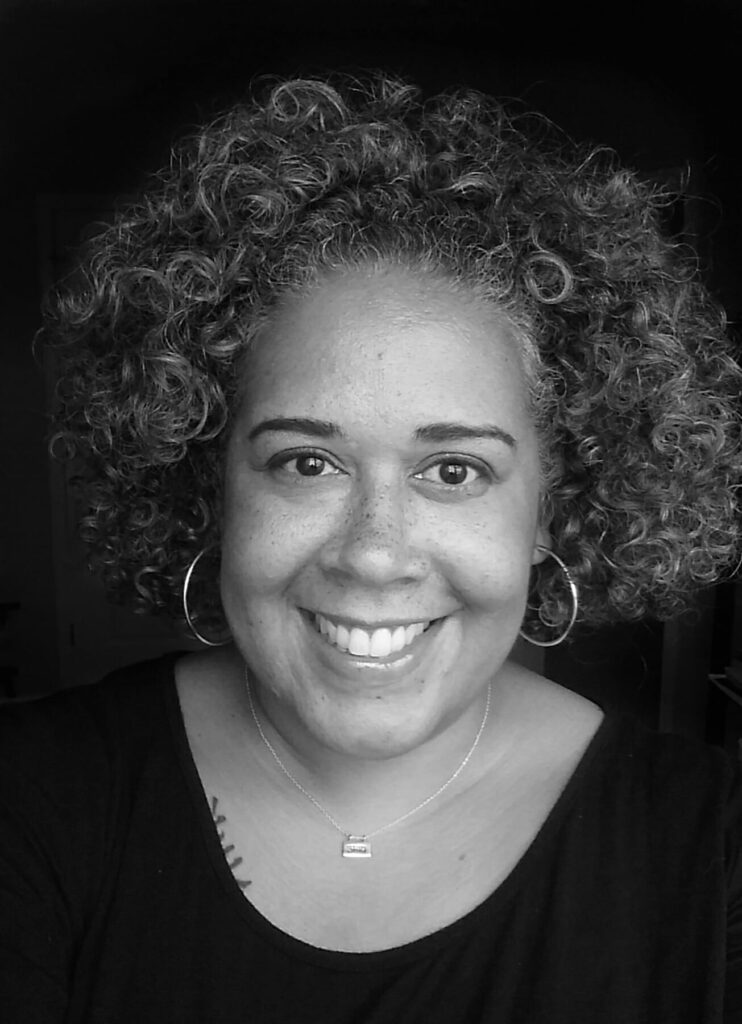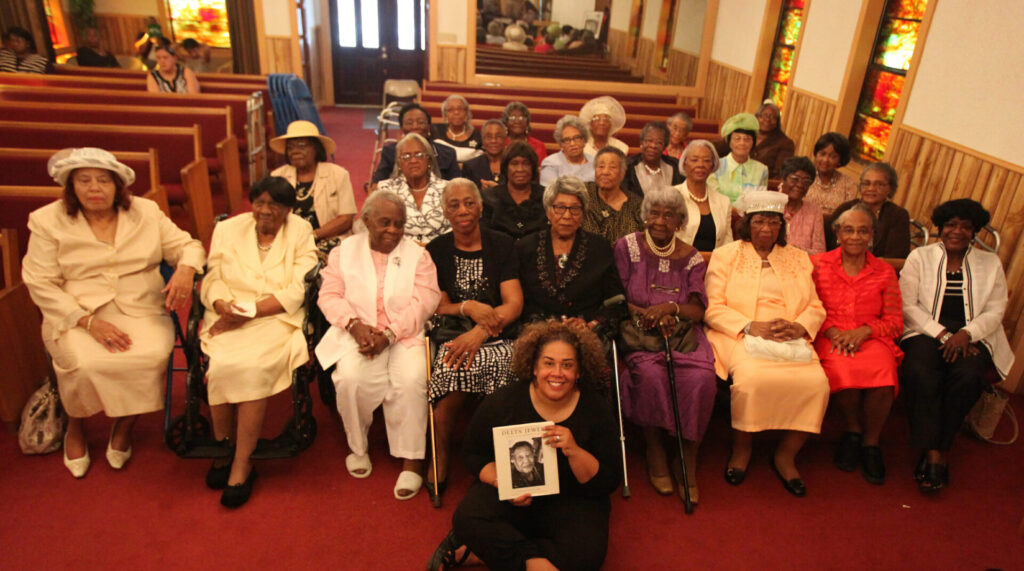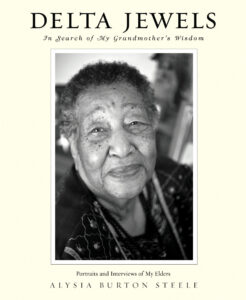Featured
Oxford's Women on the Move: Nerves of Steele
 Anna Grace Usery
Anna Grace Usery
Editor-in-Chief
anna.grace.usery@hottytoddy.com
Alysia Burton Steele isn’t native to the South, but she’s making a name for herself in the state (and beyond) after publishing a book called “Delta Jewels” that details the lives of African American church women in the Delta. The Mississippi roots took hold soon after she moved to Oxford, so she and her husband Bobby are settling in to build a future here. HottyToddy.com’s Anna Grace Usery sat down with Steele to discuss her story.

Alysia Burton Steele is the author of “Delta Jewels”. Photo courtesy of Alysia Burton Steele.
Usery: Professor Steele, tell our readers a little bit about yourself and what you do here at the university.
Steele: I am an assistant professor of journalism and new media. I’m going into my fifth year of tenure track. I teach photojournalism, beginning writing, a senior capstone class and podcasting.
Usery: And your husband also teaches here at the university?
Steele: Yes, Bobby D. Steele Jr. He was recently hired as the brand manager for the Meek School of Journalism and New Media. He has been an instructor here for three years now. We decided to commit to the community and the area. We just bought a house three weeks ago and we’re excited.
Usery: Tell me about your new furry friend I keep seeing on your social media. Spoiler alert, I love cats.
Steele: His name is Chico and he is about 18 months old. We got him at the Oxford-Lafayette Humane Society. A former student, Walter Lyle, talked me into looking at the cats there. We lost our beloved Binny that we had for 12 years back in August, and I was missing having a furry creature in the house. So we adopted Chico…who is turning our lives upside down because he is into everything. I find myself saying ‘Chico, stop. Chico, no! Chico, don’t.’ That’s what we hear in the house from morning to night.
Usery: Tell me a little bit about where you started out professionally.
Steele: I started out as a photojournalist. My first full-time job was in Columbus, Ohio. I worked there for five years and was promoted as the night picture editor. My job was to pick the photos that would run in the paper for the next day. Then I got a phone call from the Dallas Morning News to be their night photo editor and was there for about two years. Then I received a call from the Atlanta Journal-Constitution asking me to be the deputy director of photography. I started to see a shift in journalism…that multimedia was becoming the new “storytelling method.” The newspaper didn’t think that editors at that time needed to know audio and video skills. I didn’t necessarily agree with that. I decided to go to graduate school (Ohio University) to learn those skill sets so I would be relevant for the new wave of technology. From there I started teaching as a graduate student. I worked for a magazine after graduation and then came here (to Ole Miss) as a professional in residence.
Usery: You’ve taken some of those skill sets you learned and applied those to your classes, but one of your crowning achievements is you’re the published author of “Delta Jewels.” What was your inspiration for that?

Steele’s book “Delta Jewels” is a portrayal of the lives of African American church women in the Delta. Photo courtesy of Alysia Burton Steele.
Steele: When I moved to Mississippi in 2012 I was trying to get acclimated to the region, the climate and the way of life. Everything was new. It was like a new world for me. I would say I’m still trying to understand Mississippi. It’s just like when you move somewhere, you kind of miss the familiar. I just wanted some comfort. Mainly I wanted to talk to my grandmother — the woman who raised me. She passed away 20 years prior. There’s nothing like missing someone that can give you that comfort you need in trying times. I knew she was gone, but there was something about Mississippi that made it hard for me to adjust. I wanted to call her because she was a southern woman; she was from South Carolina. The landscape I was seeing reminded me of the images of visiting her family during my childhood. I wanted to talk to her, but I couldn’t. It dawned on me as a journalist and a granddaughter that I didn’t take advantage of that time that she was alive to understand more about her. To feel closer to my grandmother and the memory of her, I decided to use the skill sets I learned to interview her contemporaries. I wanted to interview women in the Delta because the images in the Delta reminded me of the images where her family lived in South Carolina.
Usery: And readers can rejoice because you have another book in the works, correct?
Steele: I didn’t plan on writing a second book. The first one consumed my life and is still consuming my life. I love it. But what I realized when I would do speaking engagements in Mississippi, people would want to share their cotton stories with me—black, white, male, female. Whereas “Delta Jewels” highlighted African American church women and reminded me of my grandmother, cotton opened the door for everyone who wanted to talk and share their stories. I love that, because cotton means so many things to so many different people in a lot of different ways. Everybody has a difference. Whenever I would speak, everyone would come up to talk to me afterwards. Somehow it always came back to cotton. It didn’t matter where I was in Mississippi—the hills, the Gulf, the Delta, the capital—people wanted to talk about their experiences with cotton and I’m not sure why. I thought ‘OK, I’m listening to you, God. Cotton it is.’

Photo courtesy of Alysia Burton Steele.
I love oral history and I’ve become very passionate about it. I think living histories are very important and we need to get them while people are still alive. So, I started interviewing people about cotton. I’m having a really good time learning more about cotton. For example, cotton seed oil is in Crisco. And I learned people would eat a fruit called Maypops. They look like lemons or limes, and they’re sweet. When people were in the field they would eat Maypops to keep hydrated. Now I’m looking up Maypops and trying to understand them.
People are sharing whatever they want to about cotton. I don’t have set questions. A cotton farmer in Marks, Mississippi talked about how machines replaced people. He missed the camaraderie of having coffee with workers and sharing experiences talking about their families. Now it’s quiet because it’s just him an one other person, and they’re using machines to pick cotton.
Usery: What made you and Bobby settle here in Oxford?
Steele: A colleague in Atlanta was hired as an assistant professor here and she called me asking for some advice about camera equipment. I was living in Ohio and I said ‘Why are you asking me all these questions about camera equipment and what to teach and what not to teach?’ She said she accepted a position at Ole Miss. I said ‘Where? Mississippi? Why?’ She said Dean Norton was fairly new to the school and was looking to add some diversity to the staff and to revitalize and hire new talent. She talked to me more about Dean Norton and how he felt about academics and hiring faculty who have practical experience. In addition to all the wonderful academia we had here already, they were looking for some more diversity on staff. I was interested. She wrote an email to Dean Norton and told him about me and he invited me to come interview here.
Usery: What’s your favorite thing about your new home here in Oxford?
Steele: In the nicest possible way it feels like I live in Mayberry. After living in Columbus, Atlanta and Dallas, which have several million people, I love being able to get from my home to somewhere in 15 minutes. Now when I see traffic I say ‘Oh, it’s rush hour…wait a minute.’ Rush hour in Oxford is very different than rush hour in Atlanta, so I can see that I’m adjusting to the community. In general I think people are very friendly. I love that I don’t know half my neighbors but they wave every time they pass the house. It’s that culture that I really like. I know this is going to sound cliché, but I really do love my colleagues. I have some really good friends on faculty here. They just make it fun.














